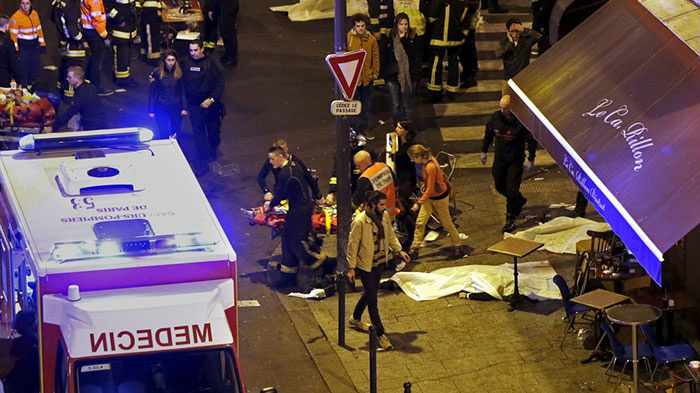ISIS Claims Responsibility, Calling Attacks ‘First of the Storm’

The Islamic State claimed responsibility on Saturday for the catastrophic attacks in the French capital, calling them “the first of the storm” and mocking France as a “capital of prostitution and obscenity,” according to statements released in multiple languages on one of the terror group’s encrypted messaging accounts.
The remarks came in a communiqué published in Arabic, English and French on the Islamic State’s Telegram account and then distributed via their supporters on Twitter, according to a transcript provided by the SITE Intelligence Group, which tracks jihadist propaganda.
An earlier statement was released but was deemed unlikely to be authentic because of anomalies in the language used, as well as an error in a date provided, according to experts on jihadist propaganda.
The statement was released on the same Telegram channel that was used to claim responsibility for the crash of a Russian jet over the Sinai Peninsula two weeks ago, killing 224 people. As in that case, it made the announcement in multiple languages and audio recordings.
President François Hollande of France said on Saturday that the Islamic State was responsible Analysts said that the nature of the attacks was more in keeping with actions of the Islamic State than with those of Al Qaeda, and the timing and extent of the celebration expressed online by the group’s supporters added weight to the claim.
“Eight brothers, wrapped in explosive belts and armed with machine rifles, targeted sites that were accurately chosen in the heart of the capital of France,” the group said in the statement, “including the Stade de France during the match between the Crusader German and French teams, where the fool of France, François Hollande, was present.”
“Let France and those who walk in its path know that they will remain on the top of the list of targets of the Islamic State,” the statement added, referring to the attacks at the Bataclan concert hall and several districts in Paris.
The style of the attack was in line with the Islamic State’s tactic of indiscriminate killings and goes against Al Qaeda’s guidelines. In a 2013 directive, the leader of Al Qaeda, Ayman al-Zawahri, stated that Qaeda operatives should avoid attacks that could inadvertently cause the death of Muslim civilians and noncombatant women or children.
He argued that targeting markets, for example, was unadvisable because innocent Muslims might accidentally be killed.
Although Qaeda branches have deviated from these guidelines on numerous occasions, their attacks reflect more carefully defined targeting, as was the case in the killings at the Charlie Hebdo office in Paris in January, when cartoonists were singled out and defined as legitimate targets because of what the group considered to be blasphemy against the Prophet Muhammad.
A Dutch fighter for Al Qaeda’s branch in Syria commented on the distinction in a series of posts on Twitter.
“Al-Qaeda focuses mostly on political & military targets instead of civilians. That’s why this could be an IS attack,” wrote the fighter, who goes by the nom de guerre Abu Saeed Al-Halabi.
In addition to the claim of responsibility, the celebrations by Islamic State supporters online were such that the SITE monitoring group, said it could suggest the Islamic State’s’s involvement.
“The extent of the celebration far exceeded past online rallying by I.S. supporters,” SITE said in an analysis. “The way I.S. supporters have embraced this attack appears much more coordinated at a much earlier stage than massive reactions to past attacks.”

